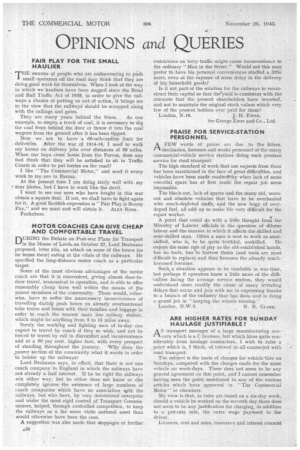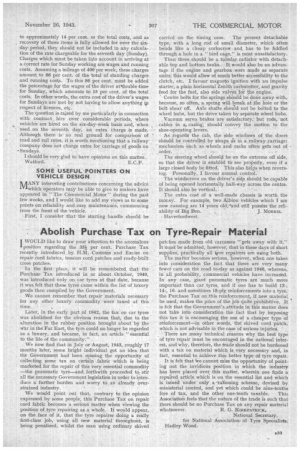OPINIONS and QUERIES FAIR PLAY FOR THE SMALL HAULIER T HE
Page 32

Page 35

If you've noticed an error in this article please click here to report it so we can fix it.
swarms of people who are endeavouring to push small operators off the road may think that they are doing good work for themselves. When I look at the way in which we hauliers have been dogged since the Road and Rail Traffic Act of 1933, in order to give the railways a chance of putting us out of action, it brings me to the view that the railways should be scrapped along with the railings and gates.
They are many years behind the times. As one example, to empty a truck of coal, it is necessary to dig the coal from behind the door or throw it into the coal wagons from the ground after it has been tipped.
Now we are to have a 60-mile4adius limit for deliveries. After the war of 1914-18, I used to walk my horses on delivery jobs over distances of 50 miles. When our boys come home from the Forces, does any fool think that they will be satisfied to sit in Traffic Courts in order to put lorries on the road?
I like " The Commercial Motor," and send it every week to my son in Burma.
At the present time I am doing fairly well with my four lorries, but I have to work like the devil.
I want to see our sons wbo have fought in this war obtain a square deal. If not, we shall have to fight again for it. A good Scottish expression is" Fair Play is Bonny Pay," and we must and. will obtain it. ALEX Ross.
Fochabers.
MOTOR COACHES CAN GIVE CHEAP AND COMFORTABLE TRAVEL DURING the Debate on Post-war Plans fbr Transport in the House of Lords on October 27, Lord Brabazon proposed, inter alia, an attack on some of the forces (as he terms them) eating at the vitals of the railways. He specified the long-distance motor coach as a particular target.
Some of the most obvious advantages of the motor coach are that it is convenient, giving almost door-todoor travel, economical in operation, and is able to offer reasonably cheap fares well within the means of the poorer members of the community. These would, otherwise, have to suffer the unnecessary inconvenience of travelling duridg peak hours on already overburdened tube trains and buses with their families and luggage in order to reach the nearest main line railway station, which might be anything from 5 to 15 miles away.
Surely the working and fighting men of to-day can expect to travel by coach if they so wish, and not be forced to travel by rail in discomfort and inconvenience and at a 50 per cent. higher fare, with every prospect of standing throughout the journey. Why deny the ,poorer section of the community what it wants in order to bolster up the railways?
Lord Brabazon says, in effect, that there is not one coach company in England in which the railways have not already a half interest. If he be right the railways win either way, but he either does not know or else completely ignores the existence of large numbers of coach companies which have no association Aith the railways, but who have, by very determined enterprise and under the most rigid control of Transport Commissioners, helped, through controlled competition, to keep the railways as a far more virile national asset than would otherwise have been the case.
A suggestion was also made that stoppages or further. restrictions on lorry traffic might cause inconvenience to the ordinary "Man in the Street." Would not this man prefer to have his personal conveniences studied a little more, even at the expense of some delay in the delivery of his household goods?
Is it not part' of the solution for the railways to reconstruct their capital so that theyield is consistent with the amounts that the present shareholders have invested, and not to maintain the original stock values which very few of the present holders ever paid for them?
London, N.16. •J. H. EWER,
for George Ewer and Co., Ltd.
PRAISE FOR SERVICE-STATION' PERSONNEL AFEW words of praise are .due to the fitters, mechanics, foremen and works personnel of the many commercial-vehicle service stations doing such yeoman service for foad transport.
The high standard of work that one expects froth them has been maintained in the face of great difficulties, and vehicles have been made roadwcitthy when lack of some essential spare has at first made the repair job seem impossible.
The black-out, lack of spares and the many old,:worn-' out and .Obsolete vehicles that have to be overhauled with much-depleted staffs,and the new bogy of overdoped fuel, all add up to make life very difficult for the repair worker. '
A point that could do with a little thought from the Ministry of Labour officials is the question of dilutee labour and the manner in which it affects the skilled and semi-skilled man. Often a man is sent to work as semi skilled, who is, to be quite truthful, unskilled. He enjoys the same rate of pay as the old-established hands, has no tools, has to borrow theirs (and tools are Most difficult to replace) and thus harasses the already muchharassed foreman.
Suck a situation appears to be insoluble in war-time, but perhaps if operators knew .a little more of the difficulties facing the average servtce station, they would understand more readily the cause of many irritating delays that occur and join with me in expressing thanks to a branch of the industry that has done and is doing a grand job in "keeping the wheels turning."
London, N.W.3. N. R. CLARK.
ARE HIGHER RATES FOR SUNDAY HAULAGE JUSTIFIABLE?
As transport manager of a large manufacturing concern which is a C licensee, but which hires quite considerably from haulage contractors, I wish to raise a point which is, I think, of interest to all.connected with road transport. The subject is the basis of charges for vehicle -hire on Sundays, compared with the charges made for the same vehicle on week-days. There does not seem to be any general agreement on this point, and I cannot remember having seen the point mentioned in any of the various articles which have appeared in 'The Commertial Motor" or elsewhere: My view, is that, as rates are based on a six-day week, should a vehicle be worked on the seventh day there does not seem to be any justification for charging, in addition to a pra.rata rate, the extra wage payment to the driver.
Licences, rent and rates, insurance and interest amount
to approximately 14 per cent. ot the total costs, and as recovery of these items is fully allowed for over the sixday period, they should not be included in any calculation of the rate chargeable for the seventh day (Sunday). Charges which must be taken into account in arriving at a correct rate for Sunday working are wages and running costs. Assuming a mileage of 400 per week, these charges amount to 86 per cent. of the total of standing charges and running costs. To this 86 per cent, must be added the percentage for the wages of.the driver attlouble time for Sunday, which amounts to 15 per cent. of the total costs. In other words, the extra cost of the driver's wages for Sundays are --met by not having to allow anything if respect of licences, etc.
The question is raised by me particnlarly in connection with contract hire over considerable periods, where vehicles are hired on the six-day-week basis and, when -used on the seventh day, an extra charge is made. Although there is no real ground for comparison of road and rail rates, it is worth mentioning that a 'railway company does not charge extra for carriage of goods on
• -Sundays.
I should be very glad tohave opinions on this matter.
Watford. E.C.P.
SOME USEFUL POINTERS ON • VEHICLE DESIGN •
• 'MANY interesting contributions concerning the advice MANY
operators may be able to give to makers have appeared in "The Commercial Motor " during the past few weeks, and I would like to add my views as to some points on reliability and easy maintenance, commencing • from the front of the `vehicle. .
First, I consider that the starting handle should be carried on the timing case. The present detachable type, with a long rod of small diameter, which often bends like a cheap corkscrew and has to be fiddled through a hole in a "bird cage," is most unsatisfactory.
Then there should be a tubular. radiator with detachable top and bottom tanks. It would also be an advantage if the engine and gearbox were made as separate units; this would allow of much better a:ecessibility to the clutch, etc. I favour magneto ignition with an impulse starter, a plain horizontal Zenith carburetter, and gravity feed for the fuel, also side valves for the engine.
Centre bolts for the springs should be done away with, because, so often, a spring will break at the hole or the bolt shear off. Axle shafts should not be bolted to the .wheel hubs, but the drive taken by separate wheel hubs.
Vacuum servo brakes are satisfactory; but rods, not cables in a, casing, should convey the motion to the shoe-operating levers.
As regards the cab, the side windows of the doors . should be bontrolkd by straps 4 in a: railway _carriage; mechanism such -as wheels and racks often gets out of The steering wheel should be on the extreme off side, so that the driver is enabled to see properly, even if a large closed body be fitted. This also helps when reversing. Personally, I fav,our normal control.
The windscreen on the driver's sige _should be capable of being opened horizontally half-way across the centre. It should, also be vertical.
The extra cost of a well-made chassis is worth the money. For example, two Albion vehicles which I am now running are 14 years old;'and still possess the reli
ability of Big Ben. J. MORRIS. Haverfordwest.




















































